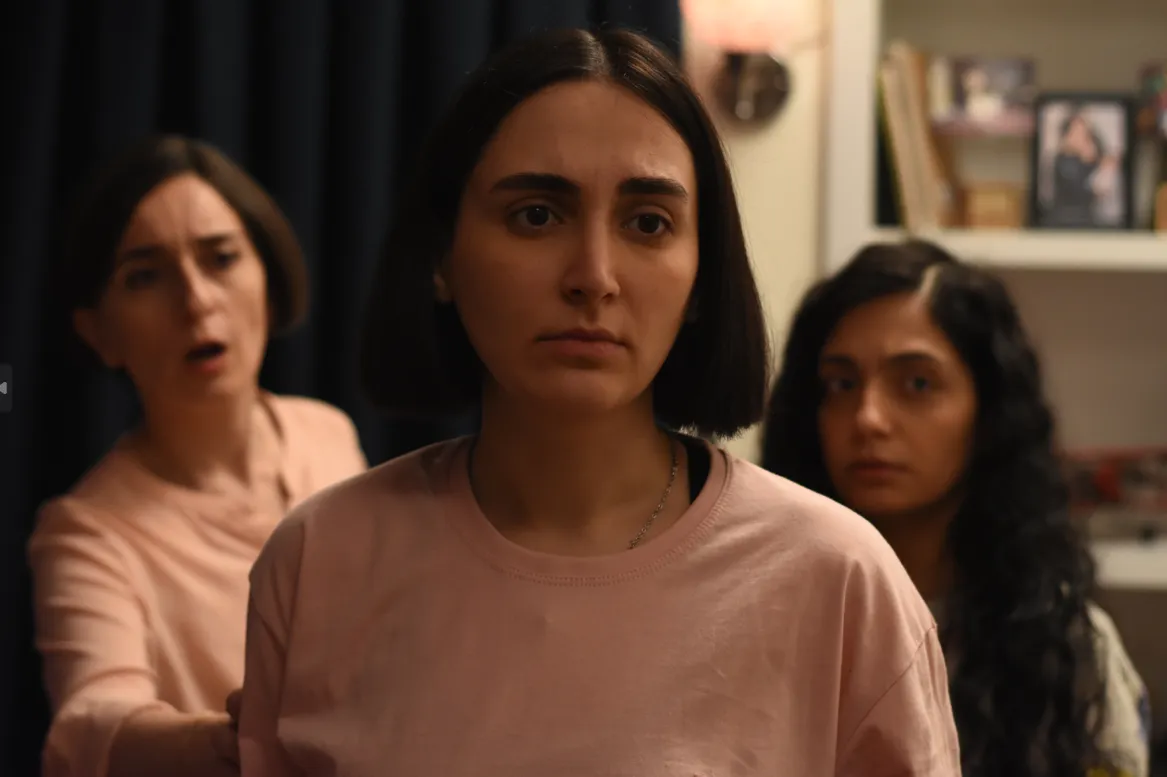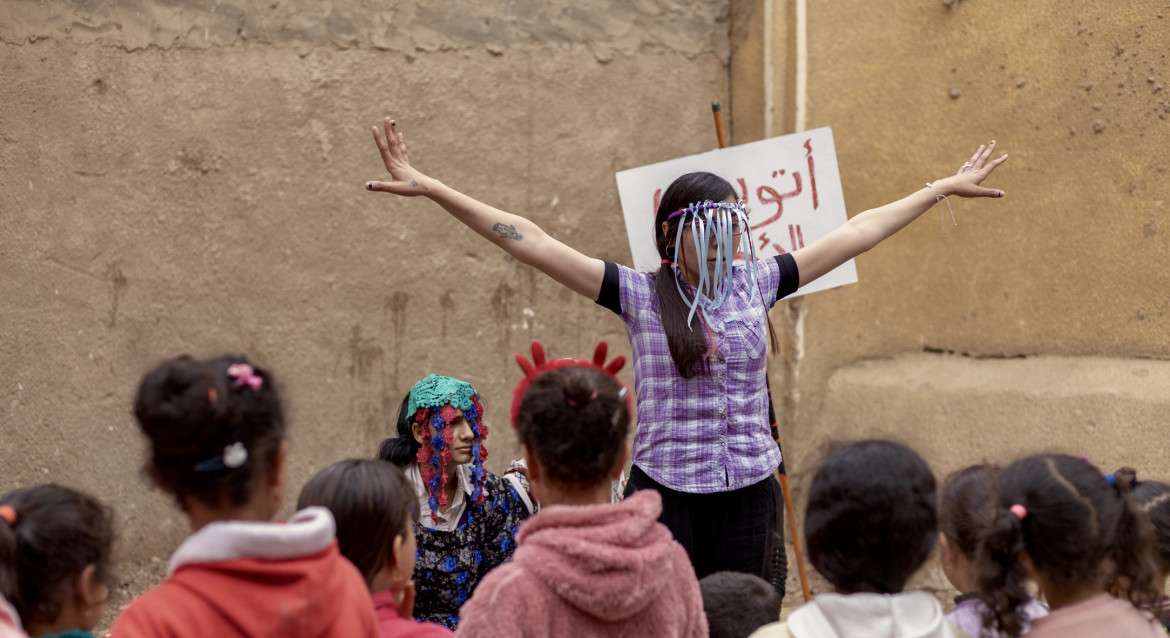“The Seed of the Sacred Fig” isn’t just one of the best films of 2024, but most certainly one of the bravest. Despite facing imprisonment in his home country of Iran, writer/director Mohammad Rasoulof crafted a probing examination of his country’s current political climate that asks deep questions about loyalty, familial obligations, and justice. The 168-minute running time might seem to suggest a grandiose epic, but remarkably, “The Seed of the Sacred Fig” is a rather tight, contained thriller. The claustrophobia becomes palpable as Rasoulof somehow manages to heighten the suspense within what was already a very stressful situation.
The film centers on the Iranian lawyer, Iman (Missagh Zareh), who is finally given a major promotion after years of hard work and service when he is appointed as an investigating judge in the Revolutionary Court. The position is not only a role of great importance but one that could spark potential dangers; the ongoing revolutionary movement against the authoritarian government have led to nationwide protests, many of which have broken out into violence.
Iman attempts to retain his honor, but soon realizes that his unexpected induction was merely a cover for his party superiors to act as executioners. Iman is put under pressure to pass death sentences for many of the cases he is presented with without ever having to take a hard look at the evidence. It’s all part of an attempt by a latent, shadowy group to suppress any attempted rebellion, and leaves Iman feeling complicit in the scheme.

Iman tries his best to keep his personal and professional obligations as distinct as possible, as he refuses to share significant details with his wife, Najmeh (Soheila Golestani), and their two daughters, Rezvan (Mahsa Rostami) and Sana (Setareh Maleki). Urging his children to stay off of social media is a challenge, as Iman isn’t able to expressly explain why they should be so restrained when it comes to expressing political opinions, particularly when abuses committed by the national police force get particularly brutal. Iman’s best line of defense is a handgun that is administered to him by his superiors, and its surprise disappearance immediately causes him to begin second-guessing where his family’s loyalty lies. Iman’s paranoia intensifies, becoming dangerous as he starts to fear that his daughters are on the path to radicalization.
Although Rasoulof is able to shed a spotlight on many of the critical issues facing Iran today, “The Seed of the Sacred Fig” filters this information through the select details that the characters are privy to. Iman knows very little about the people he is sentencing to death, and fears that any extra knowledge he inadvertently gains could only put his life in greater danger. There is a subtle, yet distinct difference in the way Rasoulof frames the sequences set in Iman’s workplace and those set with his family. Iman isn’t entirely comfortable in either situation; he’s ultimately a pawn within the government’s affairs but must pretend to be a patriarch when his family looks up to him.
“The Seed of the Sacred Fig” is not only a condensation of authoritarianism, but also a deconstruction of masculinity. Iman assumes the responsibilities that come with being a paternal person, including the potential of exerting violence if the situation calls for it. However, the cruel irony of the situation is that Iman’s anxieties quickly make him irrational, as his attempts to exterminate issues before they arise only result in exacerbating the situation. At many points, his fear over the potential of being discovered leads him to put his own family in danger, as he grows to treat them as possessions, and not actual people.
The brilliance of Rasoulof’s filmmaking lies in his restraint, as even the most minor of interactions end up hinting at the path that the film will eventually take. There’s a minor discussion over dinner in which Iman becomes highly irritable after listening to his daughters discuss the possibility of political reform; what could have been a straightforward moment of exposition ends up communicating how little regard Iman has for debate. It’s evident that Iman has denied himself the possibility of questioning the information fed to him as a result of his guilty conscience. According to him, engaging in a discussion about his country’s potential faults would in some way legitimize them in his eyes.

Zareh is truly remarkable playing Iman as his is a character that never turns into a traditional anti-hero. Iman has a justification—however absurd it may seem—for all his actions, even if they are mostly reactions to perceived slights against his ego. However, the film’s true scene-stealer is Golestani, who captures the quiet strength of a woman forced into subjugation. Najmeh knows that whatever progress is made will not benefit her, as it is her daughters who stand to shape the future in a more forward-thinking light. However, Najmeh is also savvy enough to know that similar efforts have been made in the past, and all faltered due to the unforgiving odds. There’s a deep fear that rests within Golestani’s performance, as she is fraught over what her daughters will do to condemn themselves, and what her beloved husband may prove himself capable of doing.
The flashes of the broader context of “The Seed of the Sacred Fig” are sharp and upsetting, as Rezvan and Sana are forced to involve themselves in the most controversial of topics when close friends are caught in the middle of a protest. Rasoulof’s use of social media as a news source isn’t merely a nod to modern media advances; it underscores how desperately people cling to any glimpse of truth in a landscape where propaganda spreads like wildfire. “The Seed of the Sacred Fig” simmers until it reaches an explosive climax that is just as realistic, albeit cynical, as the subject deserves.



![Anxious People [2021] Netflix Review: A Highly-engaging Dramedy where Compassion takes the Cake](http://www.highonfilms.com/wp-content/uploads/2021/12/Anxious-People-2021-768x384.jpeg)
![Midsommar [2019] Review: A Voluptuous Day Terror](http://www.highonfilms.com/wp-content/uploads/2019/07/midsommar-1-768x364.jpg)


![Fading Petals [2022] Review – A psychoanalytic albeit convoluted look at loneliness](http://www.highonfilms.com/wp-content/uploads/2022/03/Fading-Petals-Official-Still-1-768x384.jpeg)
![The Ripper [2020] Netflix Review – A Flawed Yet Reasonably Effective True-Crime Docuseries](http://www.highonfilms.com/wp-content/uploads/2021/01/The-Ripper-2020-768x432.jpg)